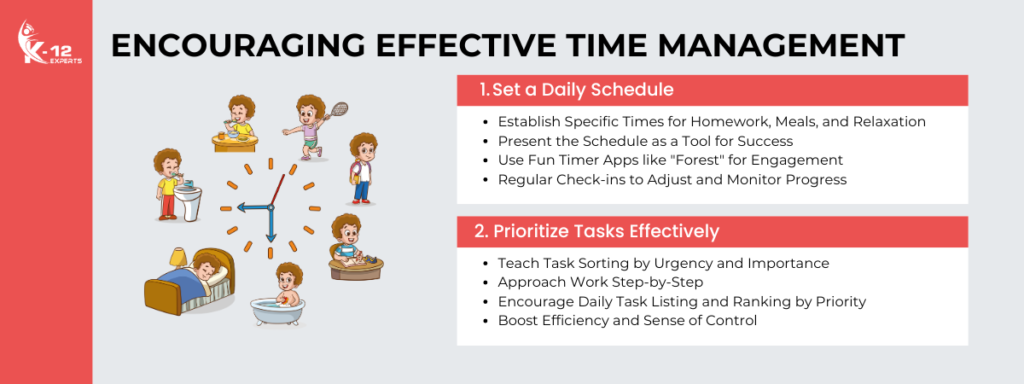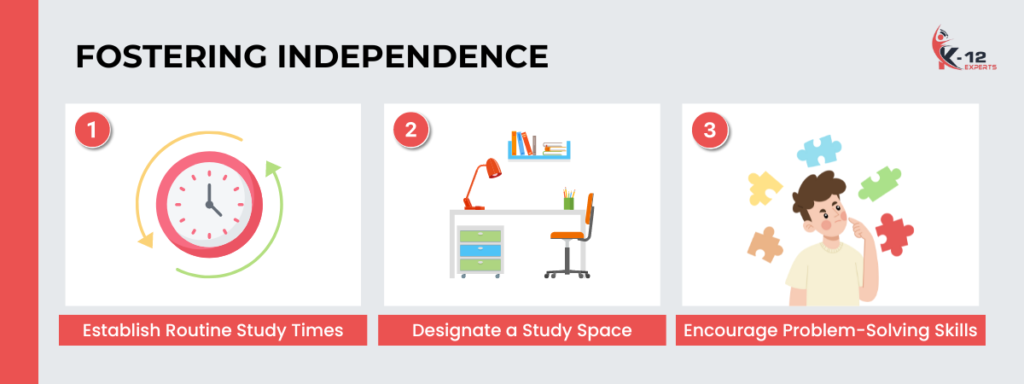As a parent, your role in your child’s education is pivotal, especially when it comes to homework. Guiding them through this process not only supports their academic success but also instills lifelong skills such as time management, problem-solving, and independent learning.
This article provides practical strategies to help you create a productive homework environment, encourage positive study habits, and foster a love for learning. From establishing a consistent routine and designing an effective study space to utilizing educational tools and maintaining open communication with teachers, these tips will empower you to support your child in achieving their full potential.
Key Takeaways
- Set a consistent homework routine to help your child develop good time management skills.
- Create a dedicated study area at home for your child with all the necessary supplies.
- Remember to divide homework into smaller tasks to make it less intimidating and easier to start.
- Encourage your child to use educational tools like Khan Academy for extra help with subjects like math and science.
- Always let your child know you believe in their ability to succeed. Positive reinforcement can boost their confidence and motivation to tackle challenging tasks.
Understanding Your Child’s Needs
To help your child with their homework effectively, it’s crucial to understand their specific needs and what makes learning difficult for them.

For example, setting up a quiet, welcoming study area can help them concentrate if they get distracted easily. Also, knowing whether they learn best by seeing, hearing, or doing can help you choose the best methods and tools.
You can make homework easier for them by dividing it into smaller parts and using tools suited to their learning style. This approach helps them complete their work and teaches them how to tackle challenges independently.
Establishing a Routine
Setting up a regular homework routine is crucial for your child, especially when it aligns with their needs and peak productivity times. To encourage your child to be independent and responsible, teach them time management skills.

For example, you might decide that every day after school, from 4 PM to 5 PM, is homework time. This consistency helps them know what to expect each day and improves their ability to manage their time.
Ensure they stick to this schedule consistently, as it boosts their school performance and teaches them discipline, which is essential for their future. Keeping a regular routine also helps your child learn how to organize their tasks, which is key to becoming more self-reliant in their studies.
Creating a Productive Space

Establishing a routine is a good start, but having a specific area for homework is just as important. Choose a quiet spot used only for studying to help your child focus better. A comfortable chair, a desk, good lighting, and a quiet environment are crucial.
Keep this space tidy. Organize school supplies in bins or shelves where your child can easily find them. This organization helps save time and lowers stress, making homework less daunting. A well-organized study area helps your child work independently and persistently.
For example, you might use a lamp with adjustable brightness for different times of the day or a noise-canceling headset to block out background noise. These small changes can make a big difference in how well your child concentrates on their work.
Encouraging Effective Time Management

Encouraging effective time management in children can significantly improve their academic performance. Help your child create a daily schedule, prioritizing tasks by due date and importance.
This approach ensures each assignment gets the attention it needs, reducing stress and enhancing organization. For instance, if a science project is due soon and requires more effort, they should dedicate more time to it, followed by the book report. Utilizing tools like a planner or Google Calendar can assist in tracking deadlines and managing their workload effectively.
Set a Daily Schedule
Creating a daily schedule can significantly improve your child’s time management skills. Establish specific times for homework, meals, and relaxation, helping them balance daily activities. Your support is crucial in ensuring they stick to the schedule, especially for homework, to prevent procrastination.
Present the schedule as a tool for success, not just a set of rules. This approach empowers them, making them feel more in control and motivated to manage their tasks independently. Your role is to guide and encourage this independence.
To make sticking to the schedule more engaging, consider using a fun timer app like “Forest,” which promotes focus by growing a virtual tree during homework time. Regular check-ins to discuss progress and adjust the schedule as needed will also help them stay on track and succeed.
Prioritize Tasks Effectively
Once you set a daily schedule for your child, it’s crucial to teach them how to sort their tasks by urgency and importance. Good planning helps them manage time better. Start by determining which homework needs to be done first and which tasks might take longer.
This approach helps your child approach their work step-by-step, which can reduce stress.
Encourage your child to make a list of tasks each day, ranking them by priority and making changes if necessary. This practice boosts their efficiency and gives them a sense of control and achievement.
Utilizing Online Resources

Online tools can significantly enhance your child’s learning experience and make homework more manageable. Educational apps and online tutoring platforms are tailored to meet your child’s individual learning pace, ensuring they grasp challenging concepts effectively.
Additionally, online study groups offer opportunities for collaboration, allowing kids to share ideas and solve problems together, which can deepen their understanding.
There are numerous resources like digital libraries and educational websites that provide valuable information for homework and foster a lifelong love of learning. For example, Khan Academy offers free lessons across various subjects, while apps like Quizlet help with quick studying and memorization. Encouraging your child to use these tools can significantly impact their academic success.
Fostering Independence

Fostering independence in your child’s study habits is crucial for their academic growth. Start by establishing a regular study schedule in a quiet, distraction-free space at home, which enhances focus and productivity.
Encourage problem-solving skills by guiding them through challenging tasks, like math problems, and then allowing them to try on their own while you remain available for support. This builds their confidence and critical thinking abilities.
Introduce tools that aid in their studying, such as the “My Study Life” app, which helps them organize their schedule and track homework deadlines. This type of planning fosters strong study habits and encourages self-reliance in their learning journey.
Establish Routine Study Times
Setting a regular study schedule is an effective way to foster independence in your child. By establishing a daily study time, you help them develop self-discipline, which is essential for academic success. Collaborate with your child to create a schedule that aligns with their homework load and learning needs, boosting their confidence and enabling them to manage their schoolwork independently.
Schools often recommend consistent study times because they mirror the structured school day, making it easier for students to transition into homework without resistance. Encourage your child to stick to their study schedule daily, which will help them start their homework on their own, reducing the need for your intervention.
For example, you could designate study times from 4 PM to 6 PM on weekdays. Utilize a simple planner or apps like “My Study Life” to track their schedule, making it easier and more enjoyable for your child to follow the routine.
Designate a Study Space
Creating a specific study area for your child can significantly enhance their ability to concentrate and complete homework independently. A dedicated study space not only provides a quiet environment but also fosters independence, demonstrating your support for their education without being overly involved.
- Consistency: Always use the same area for studying to help your child know it’s time to focus.
- Personalization: Personalize the study space with your child’s favorite colors and posters to make it more inviting and motivational for studying.
- Minimal Distractions: Ensure that the study area is away from loud noises and clutter. This helps keep your child’s attention on their work.
Encourage Problem-Solving Skills
Encouraging your child to solve problems independently can greatly enhance their confidence and equip them with vital skills for life. It’s important to teach them how to think critically and solve problems, not only for schoolwork but also for everyday challenges.
Begin by asking open-ended questions that require thoughtful responses rather than just ‘yes’ or ‘no’. This encourages them to consider various possibilities. When your child approaches you with a problem, avoid solving it for them right away. Instead, help them think it through by asking, ‘What have you tried so far?’ or ‘What do you think might happen if you try this solution?’
This method teaches them to assess different options and make their own decisions, which builds independence and resilience. These skills are crucial for their future success in any aspect of life.
Offering Praise and Motivation
Offering regular praise boosts your child’s enthusiasm for homework, teaching them to recognize and celebrate progress. Encouraging them with rewards further promotes positive behavior and perseverance.
- Celebrate Achievements: Acknowledge every success, big or small, to motivate ongoing effort.
- Offer Rewards: Match rewards to their effort, reinforcing the benefits of hard work.
- Promote a Growth Mindset: Emphasize improvement over perfection to build resilience.
This approach makes homework an opportunity, not just a duty. For example, reward completed homework with a favorite activity, showing the benefits of consistent effort.
Handling Frustration and Setbacks
Handling frustration and setbacks is an essential skill for your child, both in school and in life. When they feel upset with homework, suggest taking a short break to calm down and return with a fresh perspective.

Encourage them to break their homework into smaller, manageable tasks, reinforcing that challenges are temporary and solvable. Have them explain what they find difficult, which helps in identifying and addressing the issue.
Remind them that struggling with tough questions is an opportunity to grow. By staying positive and tackling problems step-by-step, they’ll build confidence and independence in facing future challenges.
Communicating With Teachers

Effective communication with teachers is essential when your child struggles with homework. Collaborating with teachers fosters a supportive learning environment and helps you understand how to assist your child better.
Practical steps to enhance communication:
- Set Up Regular Meetings: Stay informed about your child’s progress and address any concerns.
- Ask for Clear Feedback: Request honest assessments of your child’s performance and areas for improvement.
- Plan Together: Collaborate with teachers to develop strategies tailored to your child’s needs.
This partnership ensures your child receives the support they need.
Conclusion
As you start helping your child with their homework, your involvement is crucial. Instead of just watching, actively participate to guide them toward success.
Establishing a daily homework routine can greatly help. For instance, setting aside a specific time each day for study enhances their focus and performance.
Encourage your child to tackle assignments independently to build their confidence and problem-solving skills. Remember, your support is key to their academic growth.
By being involved and providing the right tools, like a quiet workspace and necessary supplies, you help them achieve and excel in their studies. How you assist them will significantly influence how well they do.
Frequently Asked Questions
How Can I Help My Child With Homework Without Doing It for Them?
To help your child with homework effectively, encourage them to solve problems independently. If they get stuck, gently guide them instead of giving the answer. The goal is to support their learning journey, not to do the homework for them.
What Should I Do if My Child Consistently Forgets Their Homework?
It’s important to talk about consequences, improve communication, and help your child get organized when they frequently forget their homework. Simple checklists and reminders, like using a planner or a mobile app, can be useful in teaching your child to manage their responsibilities effectively.
How Do I Balance Homework Help for Multiple Children?
Managing homework help for multiple children requires good time management and support. Dedicate specific time to each child, encourage open communication, and set up a weekly homework schedule. Using tools like K-12Experts, homework planners, or apps can help keep track of assignments and deadlines.
Should I Incentivize Homework Completion With Rewards?
It’s important to use rewards to encourage kids to finish their homework, but it’s also crucial to foster a love for learning without relying solely on rewards.
What if My Child’s Homework Seems Too Easy or Too Hard?
If your child’s homework seems too easy or hard, it’s important to speak with their teacher to discuss the difficulty level. Adjusting the homework difficulty can help your child develop independence and foster enthusiasm for learning.




